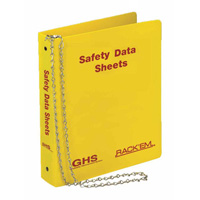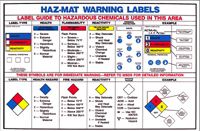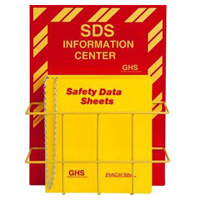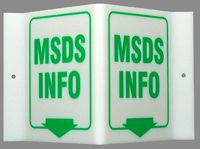 |
 |
| MSDS Topics |
Free Sites | FAQ's | Regulations | Glossary | Software | Suppliers |
| Books | Forum | Poll | Fun stuff | Quiz | Store | |
| MSDS and safety supplies | Search ALL our MSDS info | |||||
 | |||
 |
 |
 |
|
| Title: 07/15/1996 - Occupational Safety and Health Administration's (OSHA) Hazard Communication Standard (HCS). | |
| Record Type: Interpretation | Standard Number: 1910.1200 |
July 15, 1996
Mr. Mike Lopez
Safety & Compliance Associates
Post Office Box 334
Trussville, Alabama 35173
Dear Mr. Lopez:
Thank you for your letter of May 9, addressed to John B. Miles, Jr., Director of the Directorate of Compliance Programs, concerning interpretation of the Occupational Safety and Health Administration's (OSHA) Hazard Communication Standard (HCS). Your questions and OSHA's responses are presented below in the order they were raised.
1. Is there an acceptable alternative to having route drivers maintain an in-vehicle library of MSDSs in sufficient quantity to cover every commercial sale which may be made during the day?
Paragraph 1910.1200(g)(7) of the HCS is particularly relevant to your question, it describes distributor requirements for distributing MSDSs. As you may know , MSDSs are only required to be sent at the time of initial shipment and when the MSDS is updated. In terms of alternative compliance strategies, you may want to consider utilizing electronic MSDS copies on computer laptops with printers, or fax-modems as a solution to transporting the hard copies of MSDS. The ultimate solution is yours as long as there are no barriers to the flow of information to the downstream users of the hazardous chemicals.
|  Get your MSDS binders, posters, signs and more at Safety Emporium. |
2. In the workplace, if MSDS(s) are made available via computer terminal and employees are properly trained to access them, is a printer necessary or can the MSDS simply be read on the screen?
| (sponsored information) 400,000 MSDS's in your shirt pocket... |
In terms of employee accessibility, paragraph 1910.1200(g)(8) of the HCS states that these MSDSs must be readily accessible to employees when they are in their work areas during their work shifts. The standard also states that "Electronic access, microfiche, and other alternatives to maintaining paper copies of the material safety data sheet are permitted as long as no barriers to immediate employee access in each workplace are created by such options." This requirement may be accomplished in many different ways; the employer must decide what is appropriate for the particular workplace. The key to compliance with the rule is that employees get the information when they need it. Actual paper copies of data sheets, computer terminal access, FAX, or other means of providing readable copy on-site are permitted, again, as long as no barriers to employee access exist. For your information, the HCS was amended on February 9, 1994, and a copy of the rule is enclosed. Also enclosed are copies of the letter to Dr. Leo Sioris, with his incoming letter and the memorandum to Michael G. Conners referenced in your letter. The 1989 letter to Dr. Leo Sioris does not reflect the amended rule and will be withdrawn from the OSHA Computer Information System (OCIS). We regret any confusion this letter may have caused.
|
2b. If computer terminals, FAX, etc. are utilized, are employers expected to maintain a "back-up" hardcopy or will employers be held in violation of the HCS in the event of power failures or other unforeseeable events which may render the electronic system temporarily inoperative?
 This handy poster explains the common hazardous chemical labeling systems. Get yours at Safety Emporium. |
|
Sincerely,
Ruth McCully, Director
Office of Health Compliance Assistance
Enclosure
May 9, 1996
Mr. John B. Miles, Jr., Director
Francis Perkins Bldg.
USDOL-OSHA
200 Constitution Ave., NW
Room N3468
Washington, DC 20210
Re: Interpretation of HCS requirements
Dear Mr. Miles,
I am a consultant for several national trade associations. Our distributor/manufacturer members would appreciate help with several questions pertaining to the Material Safety Data Sheet requirements contained in 29 CFR, 1910.1200.
1. In a commercial route-sales operation (e.g., industrial chemicals, lubricants, welding supplies, etc.), route drivers typically sell and deliver hazardous chemicals to downstream employers via van or truck. MSDSs cannot be sent prior to delivery as drivers have no way of knowing in advance what products will be sold to what customers or how many chemical sales will be made during the day. Additionally, relief-drivers who fill in for absent drivers usually do not know whether deliveries are "first time" or not. OSHA has ruled that mailing MSDSs after delivery of the hazardous chemicals is unacceptable as violating the requirement that MSDSs must be communicated prior to or with the first delivery. Also, distributors may not require commercial customers to request an MSDS. Is there an acceptable alternative to having route drivers maintain an in-vehicle library of MSDSs in sufficient quantity to cover every commercial sale which may be made during the day?
|
2. Paragraph (g)(8) of the HCS requires MSDSs to be maintained on-site and be readily accessible during each workshift to employees while they are in their work area(s). OSHA has interpreted this requirement to allow the use of on-site computer systems with printers, microfiche machines, and telefax machines, as long as readable copy of MSDSs can be provided and be readily available to employees on-site. The key to compliance with this provision is that employees have no barriers to access to the information and that the MSDS(s) be available during all workshifts. In the workplace, if MSDS(s) are made available via computer terminal and employees are workplace, if MSDS(s) are made available via computer terminal and employees are properly trained to access them, is a printer necessary or can the MSDS simply be read "on screen"? Please reference the following OSHA interpretive letter excerpts. The first letter states that hardcopy MSDSs are required; the latter states that hardcopy is not required. "...Computer generation of FAX transmission of information would be acceptable if a hardcopy can be produced in the workplace that contains all of the MSDS information required by the standard. At a fixed worksite this hardcopy MSDS information must be readily accessible..." [underline added] file: g1002.irs letter: Lsioris 06-04-90 "...The MSDSs must be on the jobsite and readily accessible to employees when they are in their work areas during the workshift. Alternatives to actual paper copies of MSDSs, which provide readable copy on-site are permitted to meet this requirement." [underline added] file: g1001.irs memo: PClark to MConners, RA 08-07-89
|  Ensure that your MSDS collection is "readily accessible" with these handy compliance centers from Safety Emporium.
|
2b. If computer terminals, FAX, etc. are utilized, are employers expected to maintain a "backup" hardcopy or will employers be held in violation of the HCS in the event of power failures or other unforeseeable events which may render the electronic system temporarily inoperative?
3. Drugs, as defined in the Federal Food, Drug and Cosmetic Act, in solid, final form for direct administration to the patient (i.e., tablets, pills, capsules) are exempt from coverage under section (b)(6)(viii) of the HCS. Does this exemption include compressed medical gases (e.g., oxygen), subject to FDA regulation, when packaged in cylinders? The gas is not manipulated prior to delivery to the patient except to be dispensed via pressure and flow regulating devices.
4. OSHA has defined a "manufacturer" as including a distributor who repackages and/or blends chemicals. If such a distributor repackages chemicals into smaller containers and uses the MSDS which was received from the manufacturers of the bulk component(s), the name and address on the distributor's label will differ from the name and address on the manufacturer's MSDS. Assuming the chemical name and appropriate hazard warnings agree between the MSDS and label, is this acceptable?
5. According to a February 25, 1992 memo, (Dshalhoub to the Solicitor, file: f12i01.irs), the Review Commission held that the Secretary's interpretation of the term "appropriate hazard warnings" in 29 C.F.R. 1910.1200(f)(1)(ii) to require employers to list the specific "target organ" effects, of hazardous chemicals on container labels of substances shipped to downstream users, was unreasonable and not entitled to deference. Is this ruling still in effect?
 Mark the location of your MSDS collection with this sign from Safety Emporium. |
6. Many distributors (as opposed to "retail distributors") have showrooms and sales counters which cater to walk-in commercial trade. OSHA recognizes that retail distributors have difficulty in determining whether or not a customer is an employer who needs an MSDS and, therefore, allows posting a sign advising of MSDS availability "on request." Industrial distributors have a similar problem in that distributor salespeople cannot know whether an employer's purchase is "first time" or not without researching the employer's purchasing history. Also, many distributors cater to retail trade also (such as building materials distributors), even though their majority trade is commercial/industrial. May a distributor satisfy the requirement to give a downstream employer an MSDS (in an over-the-counter sale) by posting a sign similar to that of a retail distributor?
|
Thank you for your help.
Sincerely,
Mike Lopez
The official, public domain, OSHA version of this document is available at http://www.osha.gov/pls/oshaweb/owadisp.show_document?p_table=INTERPRETATIONS&p_id=22212&p_text_version=FALSE